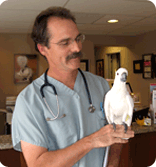Eye problems in a Blue Front Amazon

Hallo again. A few weeks ago I posted a couple of questions about my 30 year-old blue-front Amazon hen’s eye - she was diagnosed by the vet with uveitis and treated with antibiotics, anti-inflammatories, steroids in both oral and eye drop forms. After two weeks in the vet hospital I brought her home with her eye apparantly improved. However, the same afternoon the same symptoms were present again - though her treatment had only been suspended that morning. I seemed to me pointless starting it all again, so I treated her with Metacam for just over a week which did help the pain and inflammation a bit - and also gave her a mix of blueberries mashed up with honey, aloe vera gel, eyebright and echinacea to try and take another route. I stopped the metacam after about 8 days when I noticed her droppings becomeing very watery and she seemed to go off her food a bit. I am told that uveitis is very hard to fix, and she might lost the eye. Do you have any advice to offer? The vet doesn;t really know what to do, other than try the same treatment over again.
thanks for your time!
Question 2: Dear Dr. Speer, Many thanks for your response re my blue-fronted amazon hen’s eye. I have now taken her off eye drops, and she is just having metacam and baytril, once a day, in line with the vet’s recommendation. So now steroids. What I observe in her (I have her inside now, not in the aviary) is that her pupil in the affected eye does not contract - it is permanently dilated, and the brown part between the pupil and the orange iris is just not there. She keeps this eye closed quite a bit, and I think her vision from it is affected. The other eye has more of the iris showing, contracts and dilates more, but not as much as her mate, whose eyes are working as a normal Amazon’s do - pinning and dilating. She is now eating well, however, and apart from resting more, and having periods with her eye closed, and certainly being quieter generally, she still chews up sticks vigourously and has a good shout in the molrnings. The vet has seen her again and not found anything in the eye and little to change his diagnosis. So my question is really, whether you have any other diagostic advice about the symptom of the pupil being permanently dilated, and also a bit dull and greyish? Would blood tests reveal anything about this? Her stools etc are now normal. I am a bit desperate!

An important consideration when treating uvitis in any patient is that the hypothetical cause of the inflammation needs also to be treated. In your bird’s case it seems that antibacterial therapy is being forwarded as your attempt at primary treatment, with steroids and anti-inflammatory treatments being used to help address the actual inflammation that is believed to be present. Although the drug meloxicam has comparatively few adverse effects known in birds, there are several known potential problems with the use of steroids in birds - including but not limited to immunosuppression with possible secondary infections, abnormal fat metabolic disorders, increases in urinary output, and loss of appetite. These problems are somewhat dependent on dose delivered, the specific steroid being used, the frequency and duration of treatment, and the size and species of bird. In mammals, since they typical patient is much larger than your bird would be, these adverse effects are encountered much less frequently than in birds, and many veterinarians that are most familiar with mammalian practice may be inclined to use steoids more frequently than would a focused avian practitioner.
The probable increase in urinary output that you describe, combined with loss of appetite make me concerned that there may be a problem with the steroids in your bird’s treatment regime, and I would recommend that these drugs not be used anymore, pending consultation with your veterinarian. The one thing that does not necessaril fit with this possibility though, is that these observed changes in urinary output and appetite seem to have developed over a week or so after the likely discontinuance of steroid treatments. At this point in time, it may be prudent to have some blood testing performed to assess the general systemic health status of your bird (kidney, liver function in particular), have the details of the primary diagnosis of uveitis re-evaluated, and then begin to chart a different course of potential treatment. If your veterinarian is not clear on diagnosis or treatment options for your bird, I would recommend that you ask that they either consider referring you to a colleague who may be better positioned to help, or consult with a specialist about diagnosis, treatment and management options.
Response 2:
It is hard to guide you further, in the absence of being able to physically and hands-on evaluate your bird, unfortunately. Dilation of the pupil could be related to a functional blindness being present, or the development of some iris adhesions to the lens or cornea of the eye (synechiae). It is good that the abnormal droppings have returned to normalcy. Blepharospasm (squinting of the eye) may be related to pain or discomfort, but not necessarily always. In the absence of having a more detailed understanding of exactly what is going on, it would be challenging, if not impossible, to recommend specific diagnostic maneuvers that necessarily will help clarify things for you, unfortunately. Some of the basic blood testing is always a fair approach in launching a diagnostic workup in most ill birds, and these would include a baseline CBC and a good biochemistry profile. Was there any possibility of referral or obtaining a more advanced opthalmic examination performed?

































